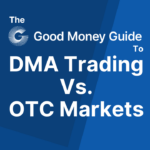Forex Trading Explained – Basic Strategy & Tips
You can trade forex in a variety of ways. The most common are:
- Financial spread betting – Betting on the price movement of currency pairs (unique to the UK)
- Forex CFDs – Contracts for difference are an OTC trading product that mimics the underlying market where you enter into a contract based on the opening and closing price of a position
- Futures trading – Get direct market access to forex futures on the CME exchange
- Options trading – You can trade forex options either on exchange or OTC
- ETFS (exchange traded funds) – You can buy currency ETFs much like buying or selling shares
Basic Forex Trading Strategy
Calling the market right is not actually that hard when trading forex. What is hard is to find forex trading strategies that can consistently increase your profits and limit your losses. Here are three forex trading strategies that should help:
1. Forex Market Timing
This is a form of technical analysis and a fairly well established forex trading strategy for ensuring that your entry and exit prices are well-timed.
Once you have found a trade that you like the application of market timing and a chartist’s view can help you gauge whether or not a price is overbought, oversold, in trend or due a reversion. Investors Intelligence, FuturesTechs, and Acuity Trading all have good packages to help with this.
Technicals are tricky to trade though on unless you have a good and experienced eye for the market. Trading currency based on economic events that are either priced into or not price into the market is a good option though. Although with this you are not really trading currency, you are trading economic events, but using FX to try and profit from your predictions.
Read more about trading with technical analysis here.
2. Strategy Discipline
Many traders enter into forex position correctly but fail to manage it appropriately once it is open. Discipline is a key factor in increasing profits and a lack of it is a massive contributor to excessive losses.
All traders should have a strategy of running profits and cutting losses.
If a trade is not going your way, close it out and look for the next opportunity. If you are showing a profit don’t be too eager to lock it in – a good trade can yield good spread betting profits. You can look to lock in some profits by using guaranteed stops and trailing stops offered by the top forex brokers as part of your risk mitigation strategy.
3. Economic Figures & Trading Forex
Economic indicators are just as important for forex trading as they are for stock, index and commodities trading., for the simple reason that they move the market.
Before you enter any trade, part of your forex trading strategy should be to look for key upcoming economic data releases.
Most forex brokers provide a good economic diary on their website that shows who and what is reporting. The reason this should be part of your forex trading strategy is that if you enter a position based on technical and fundamental analysis then results or economic data are released it totally re-balances price.
It could result in an absolute change in direction and bear no relation to your entry strategy. Trading forex can be particularly tricky on the release of key economy data. Five set of economic figures you should watch out for include the following:
- GDP figures
- Unemployment rate
- Inflation figures
- Manufacturing/Services data
- Retail/Consumer spending
The key to trading forex around the release of these figures is the market’s reaction. If, say, the stock market reacted badly to a set of the GDP figures, it tells you something about the prior expectations: too optimistic.
So you should definitely keep abreast of future economic data releases and plan accordingly. Note the market consensus. Read more on the top economic indicators to trade here.
4. Technical Analysis vs Fundamental Analysis For Forex Trading
Forex trading can be based on fundamentals or technical.
In general, the former use macro insights to produce buy and sell recommendations. The latter use prices only to determine entry and exit orders. Some may use both (hybrids).
Which is more effective?
It depends on two issues. Firstly, which system are you more compatible with? The second issue regards your ability to follow the method. Some traders eschew technical analysis because they believe technical analysis to be no better than random trading.
Meanwhile, many CTA funds have profited from using technical analysis methods exclusively. So the argument about which method is better is futile. The key is trader-strategy compatibility.
Read more on technical analysis versus fundamental analysis here
5. Managing Risk When Trading Forex
When starting forex trading (or investing), the first rule to learn is that no one will be profitable 100% of the time. Even the greatest investor can’t achieve this feat.
What this means is that you will need to prepare for losses on a significant amount of the trades.
Losses can be separated into two types
- Small recurring ones
- Large devastating ones
To survive long term, you will need to avoid the latter totally.
Remember this rule of thumb: A 50% loss means the fund needs a 100% gain just to breakeven.
A 90% loss? You will need a 900% gain to return to the starting point! How often do you see this sort of gain?
How do you avoid large losses? One, do not bet too much on any single trade. Diversify into different pairs.
- Related guide: 50 rules for successful trading
Second, ensure small losses do not swell into large losses. Stop it every time. How? Use stop losses.
Swallow one’s ego and take the loss when they are small. When a trade is going against your way, it could last for a long time. Getting out is the preferred method. Some forex trading platforms offer guaranteed stop losses where the trade will be taken off once prices move adversely against you.
On small – but consecutive – losses, either you break trading altogether or lower position sizes. Small repeated losses can be demoralising because they can last for some time. Predicting when the tide will turn for that particular strategy is hardly possible.

With over 35 years of finance experience, Darren is a highly respected and knowledgeable industry expert. With an extensive career covering trading, sales, analytics and research, he has a vast knowledge covering every aspect of the financial markets.
During his career, Darren has acted for and advised major hedge funds and investment banks such as GLG, Thames River, Ruby Capital and CQS, Dresdner Kleinwort and HSBC.
In addition to the financial analysis and commentary he provides as an editor at GoodMoneyGuide.com, his work has been featured in publications including Fool.co.uk.
As well as extensive experience of writing financial commentary, he previously worked as a Market Research & Client Relationships Manager at Admiral Markets UK Ltd, before providing expert insights as a market analyst at Pepperstone.
Darren is an expert in areas like currency, CFDs, equities and derivatives and has authored over 260 guides on GoodMoneyGuide.com.
He has an aptitude for explaining trading concepts in a way that newcomers can understand, such as this guide to day trading Forex at Pepperstone.com
Darren has done interviews and analysis for companies like Queso, including an interview on technical trading levels.
A well known authority in the industry, he has provided interviews on Bloomberg (UK), CNBC (UK) Reuters (UK), Tiptv (UK), BNN (Canada) and Asharq Bloomberg Arabia.
You can contact Darren at darrensinden@goodmoneyguide.com



